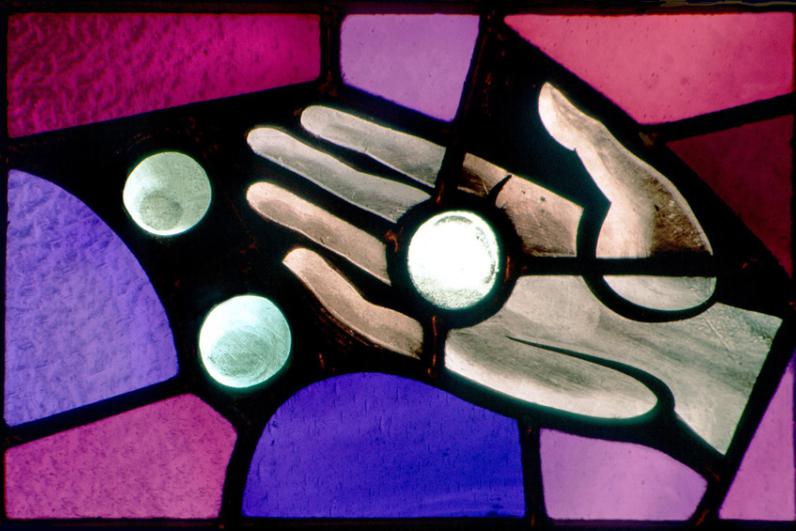The unspeakable wealth of almsgiving
''Which then is better, tell me? To be rich or to be poor? To be in power or in dishonor? In luxury or in hunger? It is quite clear: to be in honor, enjoyment, and wealth. Therefore, if you would have the realities and not the names, leave the earth and what is here, and find yourself a place to anchor in heaven: for what is here is a shadow, but all things there are immovable, steadfast, and beyond any assault." Thus said St. John Chrysostom in one of his homilies on the Gospel of Matthew.
Using an old image, he likens human life to the piloting of a ship and concludes his exhortation, "Let us therefore choose the realities with all diligent care, that we may be delivered from the turmoil of the things here, and having sailed into that calm harbor of heaven, may be found with our lading abundant, and with that unspeakable wealth of almsgiving."
Chrysostom's homilies on Matthew are unknown to most Christians. Totaling to over 1,000 pages, they constitute perhaps the greatest Biblical commentary ever written, one of the great masterpieces of the Church Fathers, and some believe the greatest work of spiritual reflection in the whole Christian tradition. St. Thomas Aquinas is reputed to have said that he would trade the city of Paris for the book. (Wouldn't it be wonderful if some Christian, somewhere -- some Thomist maybe -- renounced a planned Parisian vacation and gave the time instead to reading Chrysostom's book?)
One of the main themes of the book is the essential importance of almsgiving to a Christian life. Almsgiving would be any of the acts which count as a corporal or spiritual work of mercy. Aquinas sums up the corporal works in the verse, "To visit, to quench, to feed, to ransom, to clothe, harbor or bury." (In Latin it has a certain rhythm: "visito," "poto," "cibo," "redimo," "tego," "colligo," "condo.") Except for burial of the dead, this list is found in Matthew 25.
The spiritual works are likely to be more challenging for most of us: "To instruct, to counsel, to reprove, to console, to pardon, to forbear, and to pray." (The Latin is elegantly abbreviated, "consule," "castiga," "solare," "remitte," "fer," "ora.")
Of these, surely "to forbear" (Latin, "fer") is the most unusual and most difficult. I know a father who finds it useful to frequently remind his children, "You know, bearing patiently with the annoyances of others is one of the spiritual works of mercy." Giving money away is a lot easier in comparison. Aquinas explains: "Each of us as a sinner is annoying to those who live with him, even beside his intention." We need to bear especially with the weaknesses of others, this Angelic Doctor teaches, but also with their "unruly" actions, and in general with any burden they bear. He cites Galatians 2:2: "bear one another's burdens."
In my view, there is no act of mercy, which if widely practiced, would be a better balm for the "divisiveness" and "polarization" of American society now than this bearing with the annoyances of others. It is not forgiveness; it is something else. It is not narrowly focused but broad.
I wonder if one reason why many find works of mercy difficult is that such acts seem to be pure loss. Suppose you give money to your parish: are you less well off after your gift than before? Suppose someone, through an obvious and incontestable thoughtlessness, does something which annoys you -- you're perfectly right to be intensely annoyed -- but, instead of attempting to get back at him, show up his thoughtlessness to him, or vindicate your honor, you let it pass, smile, pray for him, offer it up, and think about how you have been like that also. Are you being a schmuck, a fool, accepting a mere negation?
What is so refreshing about Chrysostom, evident in the passages above, is how confident he is that almsgiving improves one's position, always. His conviction is completely in line with Our Lord's teaching, "lay up for yourselves treasure in heaven" and "where your treasure is, there your heart will also be." How precisely do we improve our position? Is what we gain real -- or is it something we make up out of resentment (envy, weakness), as Nietzsche charged, an imaginary pie in the sky intended to re-assert a cold spiritual control over others?
Chrysostom takes a threefold attack, relying on both faith and reason. First, like Boethius in "Consolation of Philosophy," he says that what we are rightly looking for in goods like wealth and power can't really be found in them. We desire wealth, for instance, because of the promise of self-sufficiency, and yet wealth tends to tie us up even more, inducing servitude. True wealth, of which earthly wealth is a reflection, is something intangible; it belongs to the Almighty, who can do all things.
Second, like the classical philosophers, he insists that goods of the soul, which are invisible, are better than visible goods. Therefore, in any work of mercy, we exchange a lesser good for a greater one, improving ourselves, but intangibly so.
Third and finally, now appealing to faith, he points out that Our Lord promised to reward us for works of mercy. It's not a weak faith but a strong faith that looks to this reward and acts on that promise.
- Michael Pakaluk, an Aristotle scholar and Ordinarius of the Pontifical Academy of St. Thomas Aquinas, is a professor in the Busch School of Business at the Catholic University of America. He lives in Hyattsville, MD, with his wife Catherine, also a professor at the Busch School, and their eight children. His latest book is "Mary's Voice in the Gospel of John" available from Amazon.



















